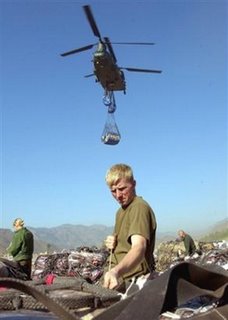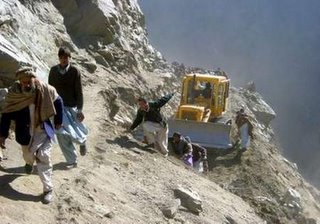Musharraf Calls It Like It Is
Update: Please consider this appeal from CARE Pakistan
Rarely have so many people been so affected by a natural disaster as the one in Pakistan on 8 October 2005. The death toll of 80,000 and rising is mind-boggling and the millions that have been made homeless likewise so on a whole other level. Pakistani President Pervez Musharaf has lambasted the members of the international community for not appreciating the seriousness of the situation. Various United Nations agencies and non-governmental organizations have reiterated his plea. A modern day airlift (see photos) has now begun. But there are still not enough helicopters, blankets or tents.
 ORIGINAL: British soldiers wrap up tents, food and other supplies to earthquake victims before airlift by British CH-47 Chinook helicopters at an airport in Muzaffarabad, Pakistan, Wednesday, Nov. 16, 2005. Two British military helicopters on Wednesday joined an increasingly urgent push to send supplies to survivors of last month's earthquake that killed more than 86,000 people and devastated large parts of mountainous northern Pakistan. (AP Photo/Achmad Ibrahim)
ORIGINAL: British soldiers wrap up tents, food and other supplies to earthquake victims before airlift by British CH-47 Chinook helicopters at an airport in Muzaffarabad, Pakistan, Wednesday, Nov. 16, 2005. Two British military helicopters on Wednesday joined an increasingly urgent push to send supplies to survivors of last month's earthquake that killed more than 86,000 people and devastated large parts of mountainous northern Pakistan. (AP Photo/Achmad Ibrahim)Forget what will be an extremely arduous recontruction phase, and forget for now what this could mean for Pakistan itself or its relations with India. We are talking about immediate survival. This distinguishes this natural disaster from most others, and makes the lack of response all the more distressing.
Talking heads have been blowing hot air and pointing to their favorite scapegoat, 'donor fatigue.' What a misnomer - we're not talking about a blood donor who needs a cookie and some rest between donations - and what a cop-out for doing far too little. There is a starker reality at work here, and the sooner we recognize it the better. This reality is not pretty nor is it politically correct.
Ask yourself: Why were people not 'tired' or miserly when the Tsunami wrecked havoc across South and Southeast Asia in December last year or when Hurricane Katrina flattened an area the size of Germany last month? Why did all manner of agencies and governments cough up more cash than could be spent? Why were there countless telethons and charity concerts? Why were individuals so generous? I spy: Empathy.
And so must we now conclude that in this case, it is somehow absent? No, not entirely, but it is sorely lacking. And as a friend, who worked in both Aceh and now in Pakistan, has told me, the logistical nightmare in the latter situation should not be underestimated. We are talking transport on foot or by mule here (this sometimes even when helicopters are available, but cannot land.) Still let's be clear, it's not like they have too much money this time around. Au contraire.
I was in Sweden when the Tsunami struck and witnessed what can charitably be described as incredible empathy. There's no call for being (too) cynical about it here, but it took me by surprise. Yes, the media can bring disasters to our living rooms, and so it was in this case. The international scope of the destruction also helped connect people from all over. Some people knew someone in Sri Lanka, some in Indonesia, Thailand or India. It snowballed into something large and lasting.
But the empathy was founded on two simple facts. One, many Swedes were killed and injured by the Wave when it hit the Western shore of Thailand. Secondly, connected to this, many Swedes have been to Thailand and at least have an idea of what it is like. There was far less coverage of what was going on in Aceh initially, even though everyone knew it must have born the brunt of the water wall's onslaught.
With Hurricane Katrina, empathy clearly came out of how it affected the great, historic city of New Orleans. And this was the U.S., and people all over believe that they can relate. Believing counts for more than you can say. At the time, I focused my minor efforts on bringing attention to the town of Pass Christian, Mississippi. A tenous connection and its total destruction was what I needed.
But here we are without the necessary empathy. It's taken me this long to write a brief post. An area few Westerners have been to is shaken to smithereens, and despite the relatively small disaster zone we do not step up to the plate. This is quickly exacerbated and soon our response this time bears no resemblence to the aftermath of Tsunami or Katrina. For when empathy and connect is absent, the 'bottom-up effect' does not kick in. Individuals do not relate or donate, Bono does not put on a show and governments are not pressured to act. But this is EXACTLY when they must do so.
 ORIGINAL: Kashmiri earthquake survivors walk along a damaged road in Neelum Valley November 16, 2005. The United Nations and British military launched an airlift on Wednesday to move hundreds of tonnes of food and shelter to earthquake survivors high in Pakistan's mountains to ensure they survive the winter. REUTERS/Amiruddin Mughal
ORIGINAL: Kashmiri earthquake survivors walk along a damaged road in Neelum Valley November 16, 2005. The United Nations and British military launched an airlift on Wednesday to move hundreds of tonnes of food and shelter to earthquake survivors high in Pakistan's mountains to ensure they survive the winter. REUTERS/Amiruddin MughalIt is the rare occasion when top-down actions and the remnants of big government can mobilize and rally people. The fortunate among us who live in representative democracies, elect people who pick up a check to think about things. It is clear that there will always be disasters when empathy will be lacking, and for those occasions there must be contingincies. These require transferring resources immediately. We the voters will thank them later, and the people on the ground will do so long before then. I mean we are talking paltry sums here. So paltry that the shame wells up inside of me. Now, what am I going to do about it?
jo
Subjects: Pakistan; earthquake; South asia; Disaster; relief; Aid; Charity; Musharraf



0 Comments:
Post a Comment
<< Home